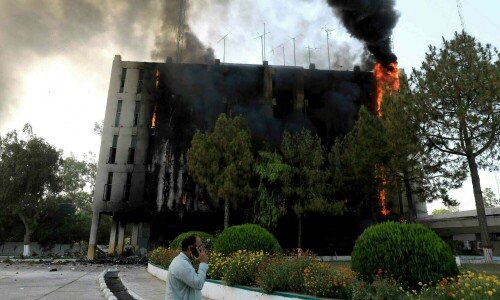The Supreme Court’s (SC) constitutional bench on Wednesday wondered what was the issue with giving civilians the right to appeal.
These observations were made as the constitutional bench resumed its hearing on a set of intra-court appeals against the October 23, 2023, five-judge order nullifying the trial of civilians by military courts involved in the May 9, 2023 riots.
The seven-judge bench was headed by Justice Aminuddin Khan and included Justices Mandokhail, Muhammad Ali Mazhar, Naeem Akhtar Afghan, Shahid Bilal Hassan, Hasan Azhar Rizvi and Musarrat Hilali.
The bench had asked the attorney general of Pakistan (AGP) in the previous day’s hearing to explain his 2023 statement about granting the right to appeal to those convicted by military courts. The statement made by AGP Mansoor Usman Awan before the SC bench in 2023 came up during the hearing of the appeals. During a hearing on Aug 2, 2023, the AGP had told a five-judge SC bench that the government was working on legislation to give the right of appeal to those convicted of attacking military installations on May 9.
Justice Hilali remarked during today’s hearing, “How can you talk about fair and transparent trials, [when] decisions are made in military courts under the shade of Kalashnikovs. What problem will arise if the government gives civilians the right to appeal?”
The seven-judge bench had taken up a set of 38 intra-court appeals (ICAs) moved by the federal and provincial governments as well as the Shuhada Forum Balochistan etc against the SC’s Oct 23, 2023 verdict.
The hearing
AGP Awam appeared in court and took the position that he had learned from Additional Attorney General Aamir Rehman that the court had summoned him.
“When a court-martial trial is held, there is a complete procedure. The entire record of how a military trial is conducted is with the court.
“If someone is sentenced to death, it is not implemented until a decision is made on the appeal,” he stated.
Justice Mandokhel said the judges were discussing the right to appeal since it was a fundamental right. He said fundamental rights were provided for in the Constitution and that was the issue before the bench at this time.
The AGP responded that when this matter had previously come up before a full court, the court itself had given three options.
Justice Mandokhel responded that those three options were still there and asked AGP Awan to answer whether there was a right to appeal or not.
Justice Mandokhel continued, “If someone is given the right to a fair trial, what is the problem? The institution itself is the complainant; how can it hear the case?
“Do the federation and the provinces not have confidence in their institutions? If the courts are abolished, then what will happen?” he questioned. “People trust us only 50 per cent because of our decisions. What will happen if the courts are abolished?”
AGP Awan responded that both he and the judges were a part of the judicial system and needed to fix the system together.
Meanwhile, Justice Rizvi noted that “those who conduct trials in military courts would not even know the law of evidence (Qanoon-e-Shahadat), evidence can be misjudged in military courts.”
Justice Hilali asked the AGP how he could talk about fair and transparent trials when “decisions are made in military courts under the shade of Kalashnikovs. What problem will arise if the government gives civilians the right to appeal?”
Justice Mandokhel added here, “We cannot even see the trial records of military courts. Is the government giving the right to appeal or not?”
Justice Afghan remarked that a constitutional amendment should have been enacted for the court martial of civilians.
Justice Mandokhel reiterated that the matter was not about how serious the crime was. “It may be a serious and horrific crime. If a terrorist also commits a crime, are there fundamental rights or not?” he questioned the state counsels.
At this, the Ministry of Defence’s counsel, Khawaja Haris Ahmed, said that even military personnel had their fundamental rights suspended, asking if they were still not Pakistani citizens despite that.
Justice Mandokhel remarked that members of the military signed up for the armed forces of their own will.
“Those who join know that fundamental rights will be suspended. Suspension of fundamental rights is linked to crime. It is also a soldier’s choice whether to commit a crime or not,” the judge said.
The court adjourned the hearing until tomorrow.















































